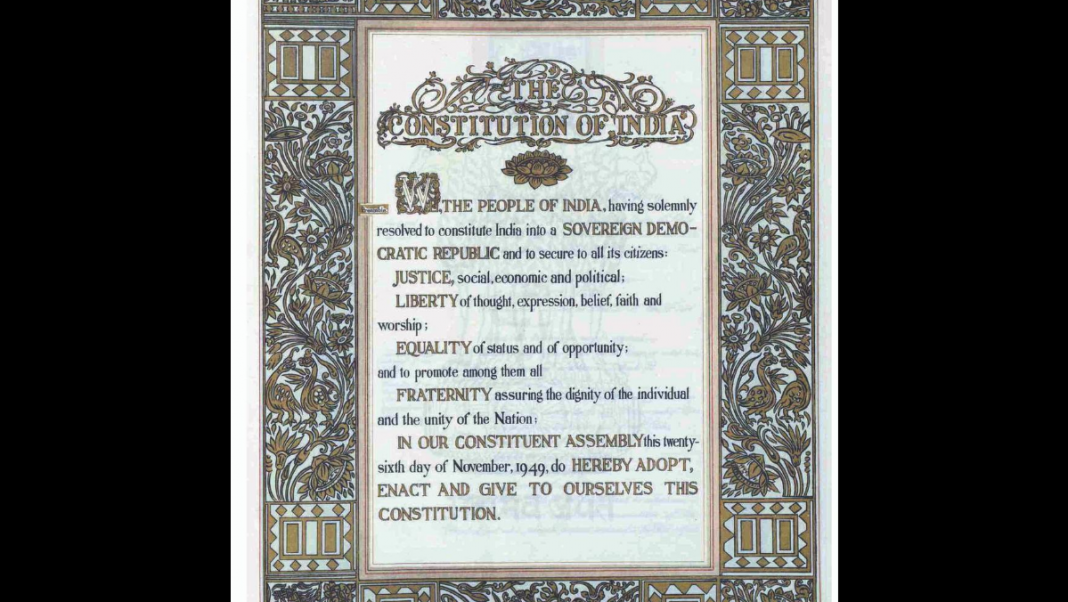Two advocates and a Social Worker filed a rather tendentious petition before the Supreme Court of India. The said petition seeks deletion of the words ‘Secular’ and ‘Socialist’ from the Preamble and Section 29A (5) of the Representation of the People Act. Thus, seeking a judgement overruling the judgement passed in perhaps the most famous case of India : The Kesavananda Bharati Case.
The Forty-second amendment of the constitution of India, enacted in 1976 added the words ‘Secular’ and ‘Socialist’ in the Preamble of India. Interestingly, Nehru along with chairman of Drafting Committee, B.R. Ambedkar opposed this addition. Professor KT Shah discussed this in the Constituent Assembly. Then why did the Indira Gandhi government make this addition?
The Emergency
During the emergency, in 1976, civil liberties of citizens stood endangered. The words ‘secular’ and ‘socialist’ were added in the Preamble to reassure the nation that the minorities would be safe and the rich upper class would not dominate the economy. However, the amendment has come under the scrutiny of the masses time and again.
This petition has again brought this matter in spotlight. The petitioners intend to launch a political party. They claim that the Election Commission of India (ECI) asked them to follow the principles of socialism and secularism. As mentioned in our Preamble by the 42nd amendment and in the People’s Representation Act of 1951.
The petitioners are Balram Singh, Karunesh Kumar Shukla and Pravesh Kumar. Meanwhile, advocate Vishnu Shankar Jain filed the petition.
In 2015, Shiv Sena took up this same issue by demanding removal of the words ‘secular’ and ‘socialist’ from the constitution and preamble through amendment. However, the then government turned down this demand of Shiv Sena.
Additions to the Preamble under the 42nd Amendment
In their petition they claim that the 42nd amendment is “antithetical to the constitutional tenets as well as the historical and cultural theme of India”. To explain, the 42nd Amendment added these words to the constitution. In fact, this amendment has been termed “illegal” over the years. In light of the claims that it violates the principle of freedom of speech and expression and the freedom of religion.
The petitioners also allege that the amendment did not follow debates and / or normal parliamentary procedure. Stating that during that time the leaders of the opposition party were locked in jail. It must be noted that the then Government passed this amendment during the Emergency.
Representation of People Act
In their PIL, addition of the words ‘secular’ and ‘socialist’ in section 29A (5) of the Representation of People Act, also stands challenged.
Representation of People Act makes it compulsory for political parties to make specific provision in their memorandum. Vide this provision, the Act mandates true faith and allegiance to the constitution from the political parties. Thus, also to the principle of ‘socialism’ and ‘secularism’.
The petitioners seek a declaration that the government has no right to ‘compel’ people to follow principles of socialism and secularism in their personal lives. That, explicitly, the constitution or the government cannot ‘compel’ citizens or political associations to be secular.
Hence, the petitioners demand the removal of words ‘secular’ and ‘socialist’ from Section 29A (5) of Representation of People Act. While also seeking their deletion from the Preamble.
Preamble : Basic Structure of the Constitution
The basic structure of the Constitution cannot be amended. Various judgments since 1973, i.e. the Keshavananda Bharati Case, have reinforced the principle that the basic structure of the Indian Constitution cannot be subjected to amendments. That the power to amend is not the power to destroy.
The Preamble is called the soul of the Constitution, thus, forming a part of the basic structure. For example, Articles 14 provides for equality in general. Article 15 prohibits discrimination on the grounds of caste, colour, religion, sex or of any of them, making the government secular. In other words, the government will and shall not discriminate on the basis of religion, language, caste, place or class. The foundations of these ideas and the rest of the Constitution flow from the Preamble.
Understandably, the Apex Court has declared the Preamble as part of the basic structure of the Constitution. More specifically, in 1994, vide the Bommai Case, the Supreme Court held that secularism was a basic feature of the Constitution.
As a matter of fact, the PIL stands against the basic structure of the Constitution in terms of its demand for changes in the Preamble of the Constitution. The proceedings of the case will prove to be a spectacle, while also testing the fabric of our constitutional values.

